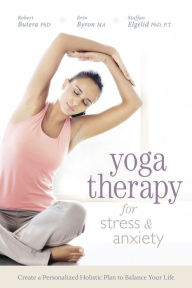We all live with stress. We all have experienced anxiety. The practice of yoga has long been recommended as useful for assisting with managing stress, particularly since it encourages a meditative mental practice and relaxing physical movements. But there are several schools of yoga that can feel anything BUT relaxing, particularly if the practitioner is new to yoga, or has anxiety issues. The sense of competition, of failing, of being too tight to get into a posture, of being to weak to hold a pose . . . a yoga class may create anxiety, not relieve it.
Yoga Therapy for Stress & Anxiety begins by offers a holistic practice designed to provide the reader with specific actions to better manage the presence of stress in their lives. This practice revolves around a daily routine of journaling, mental exercises, and (or course) yoga.
The journal work offers a way to identify the causes of stress and be prepared for its presence. Moreover, it allows the reader to understand her own reactions to stress and begin to contemplate different ways to respond. For example, many of us literally tighten up when we get stressed: our shoulders 'climb into our ears' or our breathing grows shallow. This in turn constricts bloodflow and oxygen throughout our body. If instead we recognize that we are beginning to react that way and consciously choose to do something else: drop our shoulders perhaps, or take deep breaths, we often find that we are not stressing out, or minimizing how bad it gets.
The mental exercises will be familiar to anyone who has worked with affirmations before. The reader is given ways to rephrase intentions, reframe “thought patterns,” and create a life where (as the authors write) “suffering is optional.” That's a bit optimistic and rainbow-glittery, but the science and background of the re-programming is solid. Specific sections address eating habits, workplace stress, and personal relationships.
Finally, there are yoga postures. Drawn clearly, some of the postures will be challenging for new students, and those of us who are overweight or out of shape. But the authors are understanding and encouraging, giving readers permission to “jump around” and tackle exercises in whatever order works for us, the reader.
Having gone through major illness that took years to recover from (I'm not sure I am) I wish I'd had this program years ago; I suspect my recovery would have been faster.
Many yoga programs are full of 'shoulds' or even 'musts'. Yoga Therapy for Stress & Anxiety manages to sound sane, and supportive, from the outset. The program can feel daunting, and it is intensive if all of it is done. But there is no reason not to do just part -- the yoga, maybe -- and leave the journaling and mental work for later when you are feeling better.
Highly recommended.
~review by Lisa Mc Sherry
Authors: Robert Butera, MDiv, PhD, Erin Byron, MA, Staffan Elgelid, PT, GCFT, PhD
Llewellyn Publications, 2015
pp. 360, 19.99

